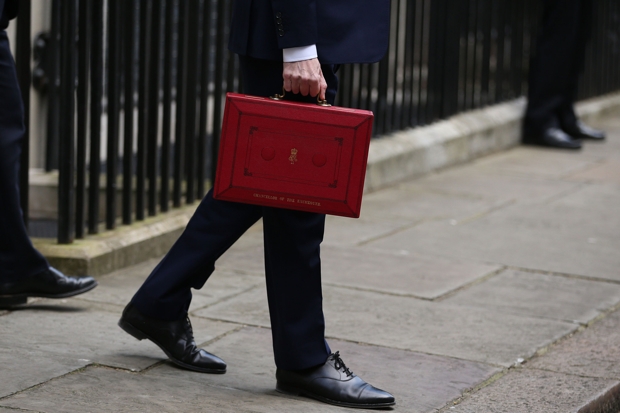[audioplayer src=”http://rss.acast.com/spectatorpolitics/georgeosbornesbudget-2016/media.mp3″ title=”Fraser Nelson, Isabel Hardman and James Forsyth discuss today’s Budget”]
Listen
[/audioplayer]
- Sugar tax on drinks with over 8pc sugar from 2018. A tax on the poor.
- Chunky growth downgrades. This year, GDP to grow at 2.0pc (down from 2.4pc) next years at 2.2pc (down from 2.5pc) and at 2.1pc (down from 2.4pc) in 2018/19.
- Debt target published just six months ago has been missed already because debt/GDP ratio is still rising.
- Corporation tax to be cut to 17pc by 2020, an improvement on previous 18 per cent target. About the only bit of good news.
- A mighty £1.4 billion cut from disability benefits Usually a political lightning rod.
- Under-40s to be allowed to open lifetime ISAs, with government contributing. To compensate for record-low interest rates which are crucifying savers.
- North Sea lifeline: petroleum tax abolished (easy to do, as the now-lossmaking North Sea sector isn’t contributing tax anymore).
- Extra £2.3 billion cuts but he hasn’t worked out where from. OBR says we now have £3.5 billion “as-yet-unidentified cuts”.
- Tax thresholds raised moderately, in line with Osborne’s election promise to lift the threshold for the 40p rate of tax at £50,000 by 2020.
- Spending forecasts jiggled around: He’ll borrow far more in 2018 then promises that he’ll suddenly behave and hit his target in 2019. The forecast for both years are so far out that neither should be taken seriously.
- Stuff on schools, rail, local government – and other announcements that have nothing to do with a Budget.
This is the fourth Budget that George Osborne has delivered in 12 months: he was running out of things to say, and it showed. His debt target slipped, but not by much: it wouldn’t have mattered at all had he not made such a fuss about hitting this target just six months ago. This was a Budget of fiddles – but that’s no cause for relief.
One of those fiddles was a £520 million levy on sugary drinks. Osborne spoke, at length, about the five-year-olds who eat their body weight in sugar. He declared that he will not sit back and – em, refuse to tax the blighters. This is, of course, a tax on the poor – as Ross Clark has said in The Spectator. Why is it that whenever anyone proposes a tax on the wealthy all hell breaks loose, but when someone proposes a tax on the poor there is no more than a faint whimper of protest? Jeremy Corbyn warmly endorsed this policy in his (actually quite decent) response to the Budget – a sure sign that the is a bad idea. Rupert Harrison, former chief aide to the Chancellor, candidly admitted that it was perhaps designed to take the front pages tomorrow.
North Sea oil revenues collapse It’s pretty grim if you’re the SNP, who had hope to have £8bn of oil revenue to spend. As the below chart shows, it’s vanishing. So yes, while Osborne has abolished the North Sea tax, it won’t cost him anything.
The SNP had expected £7.5bn of oil revenues at this stage: instead it’s £100 million (or probably less). As Osborne said in the Budget:-
“None of this support would have been remotely affordable if in just eight days time Scotland would break away from the UK as the nationalists wanted.”
Osborne misses his debt target. Six months ago Osborne presented his debt target to Parliament, saying the debt/GDP ratio would fall every year. His decision to shy away from deeper cuts last November put him right up against the edge of this limit. And, as you would expect, he has now gone over it. It’s pretty embarrassing: he presented debt targets to parliament, dared Labour to vote against him – and then failed to meet them himself.
Osborne also right to boast how cutting 50p tax has led to best-paid 1% now contributing a quarter of income tax. pic.twitter.com/IpwQjTB8Lp
— Fraser Nelson (@FraserNelson) March 16, 2016
Here are the debt forecasts:
- Debt forecast to be 82.6% of GDP next year, followed by 81.3% in 2017/18, then 79.9% in 2018/19, then 77.2% in 2019/20 and 74.7% in 2020/21.
- Deficit forecast to be 2.9% next year, followed by 1.9% in 2017/18 and 1% in 2018/19.
And a bit of Project Fear. Osborne said that the EU would lead to ‘disruptive uncertainty’. The OBR’s forecasts are based on the assumption that the UK will remain in the EU. Pretty outrageous: the OBR is supposed to be independent. Why is it being enlisted into the “in” campaign.








Comments